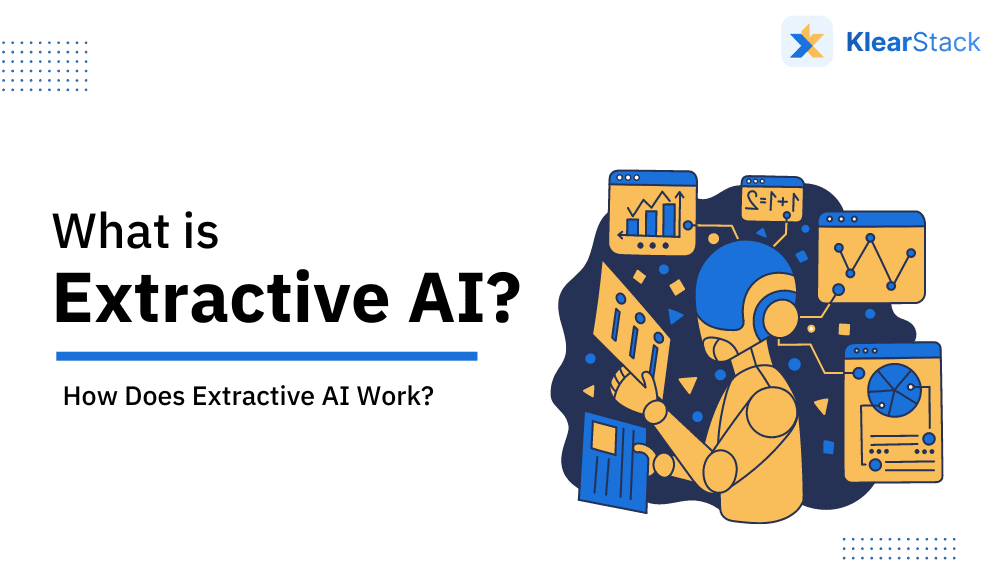If you’re wondering ‘What is Extractive AI,’ then we have the right explanation for you in this blog.
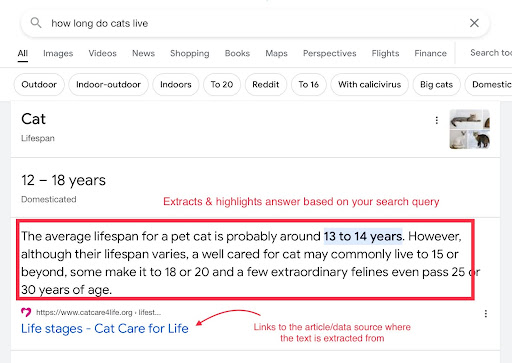
Example of Extractive AI: Have you ever searched for something on google, and it provides you with a highlighted text (or a featured snippet) as the answer? That’s what extractive AI do. Seriously!
Businesses today are thriving by making great use of AI tools like ChatGPT and Google Bard. These tools enable them to generate new ways to market their products. They can suggest defects in data, read customer’s preferences, and predict their shopping behavior.
On the contrary, not all businesses rely necessarily on these AI tools to attain growth and improve their operations. Why? Because their approach does not require creativity, but rather search-based accuracy.
This suggests that the roadmap to AI diverges into two specific areas: Generative and Extractive. Many confuse the use of one approach with the other. But to make the best of AI in your business begins with understanding how these two approaches handle data differently.
What is Extractive AI?
Extractive AI is an AI that makes use of NLP (Natural Language Process) to recognize exact keyphrases, sentences, or passages from a large volume of documents. It lets you enter your preferred keywords, and provide the exact text relevant to that keyword-based search query.
Many businesses process large databases, such as 1000+ invoices daily. However, this leads to inaccuracies and errors within the business such as:
- Invoices fail to reach its recipient within the email.
- Confusing invoice format and structure that makes it difficult for customers to understand.
- Invoice data goes missing.
- Errors in numbers (eg., decimal point put in the wrong place, incorrect sum amount, and so on).
- Wrong customer contact number.
While these concerns may look small and dismissable, it cost the company its customers’ trust.
This is where Extractive AI can help automate the whole process. Although it can’t suggest fresh ideas on getting your customers’ trust back, it takes care of daily repetitive tasks with great accuracy.
This not only saves potential costs for every invoice but also enables your employees to focus on other strategic aspects of your business.
Must-Read Articles
- The Ultimate Guide to Intelligent Data Extraction
- How to Use AI for Invoice Data Extraction and Processing?
How Does Extractive AI Work?
Based on the keyword or query that you enter, extractive AI will scan a given document and extract the relevant data that answers your query.
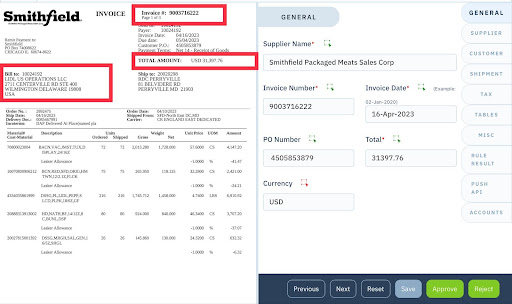
KlearStack(an Extractive AI)—can search and extract important details of your document with great accuracy. Schedule a 30 minutes demo session today!
As you can see in the above screenshot, Extractive AI operates on your searched keywords. However, unlike ChatGPT, it won’t come up with creative responses. It will rather provide information from within the document that you upload.
Businesses that rely on large data sets and deal with multiple documents daily, greatly benefit from generative AI.
How Extractive AI works for Businesses?
Step 1: Sign in to the tool.Upload the document that you want to extract specific text or data from. It can be of any size/length.

Step 2: The tool automatically recognizes and extracts essential details of your document without human intervention. For instance, when you upload a customer invoice, it extracts details like: supplier name, Invoice number, total, currency, and so on.
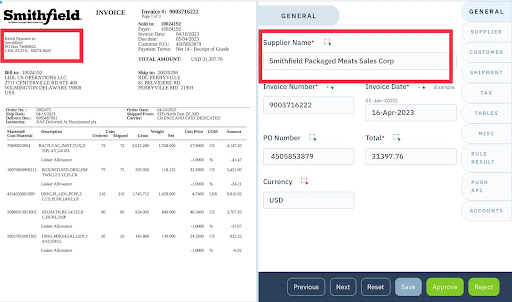
Step 3: The extracted information is further displayed in categories like: General, supplier, customer, and so on) for ease of retrieval.
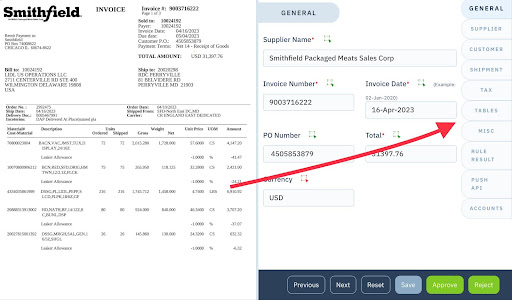
Step 4: It also maintains the table structure of your uploaded invoices. This helps keep away from potential errors, and ease of information display.

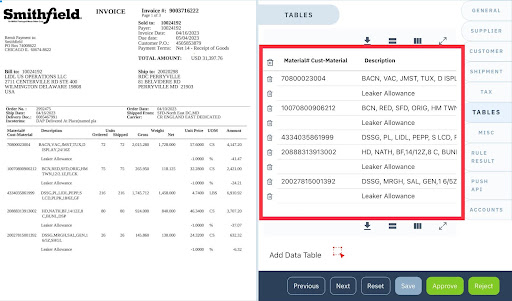
Difference Between Extractive AI and Generative AI
To be able to use AI technology for the growth of your business, it is essential to learn how different AI models can handle your data differently.
Many businesses would go about using ChatGPT straight away, only to realize it’s making things more complicated.
- Inaccurate answers
- Spending hours trying to train the tool and generate the desired results
- Out-of-context responses
- Unreliable suggestions
Whereas others are relying on it completely for writing sales emails, analyzing customer data, and generating fresh ideas in marketing their products.
Regardless of the AI approach, businesses truly care about growing and optimizing their operations. So if you’re one of them aiming to get started with AI technology, here’s what you need to know about both:
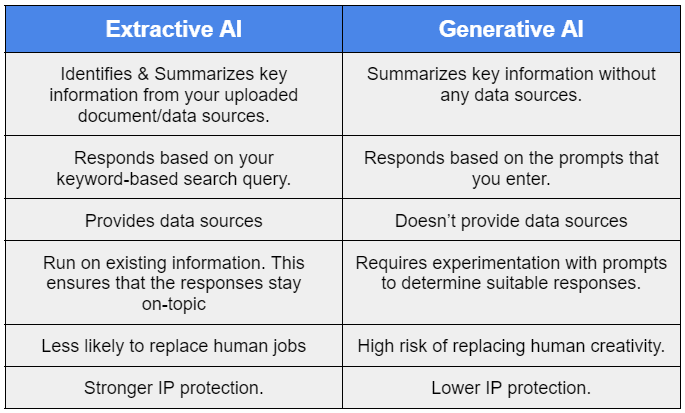
If you’re still not convinced why should you be using Extractive AI, then let us tell you:
- It provides more transparency in where the text is being picked from. You’re aware of the data sources and thus rely on it. Unlike extractive AI, generative AI tools like ChatGPT run on your prompts given, which may or may not offer reliable information.
- Poses less risk of customer data security. Whereas it’s still a question of whether AI tools like ChatGPT are safe for using customer data.
- Summarizes and extracts the exact information that you’re looking for. In contrast, Generative AI may hallucinate.
Can ChatGPT Replace Google?
As businesses use ChatGPT models to pursue various tasks such as:
- Generating content for social media
- Writing marketing emails
- Internal or external communication
- Decision making
- Generating short narrative text
This poses a question—can ChatGPT be used as an Extractive AI? Will it replace extractive AI models like Google?
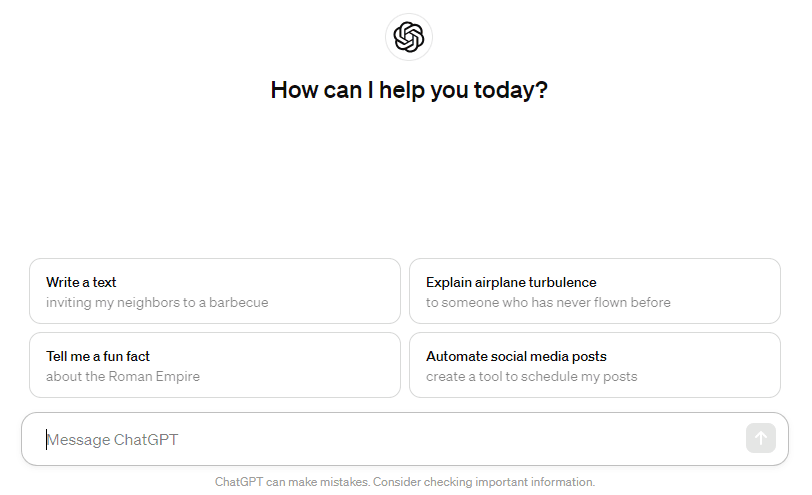
Can ChatGPT replace Google (an extractive AI model)?
The answer is NO.
Although ChatGPT has huge potential to offer the answers that you’re looking for, it fails to link to the exact article where it captured the response from. This questions the reliability of the response generated.
Whereas Google, upon each search query, it will provide you with relevant data sources to the extracted text. It can cite documents and data sources upon each keyword-based search query. This demonstrates high reliability of responses that businesses should go for.
This also leads us back to the question—How much should businesses rely on ChatGPT? And the answer is—Not really. You should definitely seek the tool for assistance, but it’s always best to cross-check its generated responses with other data sources.
Relying on it completely would signify the end of reliable information and decision-making.
Use Cases of Extractive AI for Businesses
#1. Processing Customer Invoices
If you’re a business that processes 1000+ customer invoices daily, then you must know that there’s no chance of making errors. Regardless, so long as you’re recording data manually, errors and inaccuracies are inevitable.
However, extractive AI tools save you from making mistakes. It accurately identifies and extracts key invoice details such as:
- Invoiced items
- Date of issue
- Billing breakdown
- Due date
- Discounts (if any)
- Late penalty details (if applicable).


This allows you to maintain a satisfactory customer relationship, make payments on time, and let no invoice go missing.
#2. Trading Goods Across International Borders
Business owners who are attempting to ship goods internationally, often worry about several things: “What if my goods get lost in transit?” “What if they don’t reach the destination on time?” “Who should be paying for the Bill of Lading?”
Extractive AI helps settle these worries by offering clarity. It allows you to
- Monitor and analyze real-time shipping data.
- Seek insights into the location and status of goods during international transit.
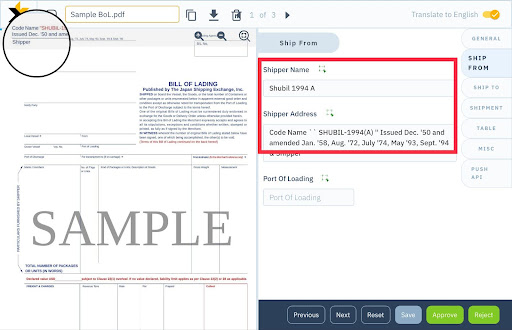
The tool extracts key information from shipping updates like shipper details, address, port of loading, and so on. This help alleviate concerns about lost or delayed shipments.
Additionally, it can assist in predicting potential financial impacts, allowing business owners to proactively manage cash flow and secure funds more effectively based on the status of their shipments.
#3. Analyzing Sales and Identifying Customer Trends
The tool can identify and analyze exactly the increase or decrease in customer purchase behavior. It can further assist you in rearranging product prices, optimize marketing strategies, and drive corrective actions.
For example, in pricing analysis, extractive AI can identify trends by recognizing historical pricing data points and revealing patterns of price fluctuations over time. This insight is valuable for businesses to adjust pricing strategies, anticipate market changes, and stay competitive.
Moreover, in financial markets, extractive AI can process news articles, social media feeds, and other textual data to identify sentiments and trends that may impact investment decisions. By extracting and analyzing this information, businesses can make more informed and timely financial decisions.

Ready to Invest in an Extractive AI Tool and Eliminate the Risk of Human Errors?
Be it texts, images, pdfs, emails, or more, KlearStack is a no-code platform with a drag-and-drop feature that can automate your business data analysis easily, fast & securely.
No Regex Rules. Easy Setup. Cancel Anytime.

